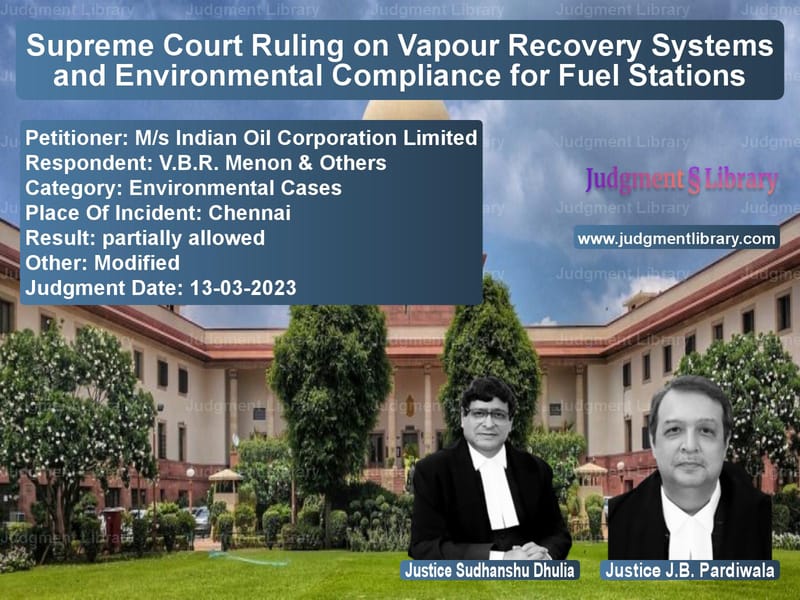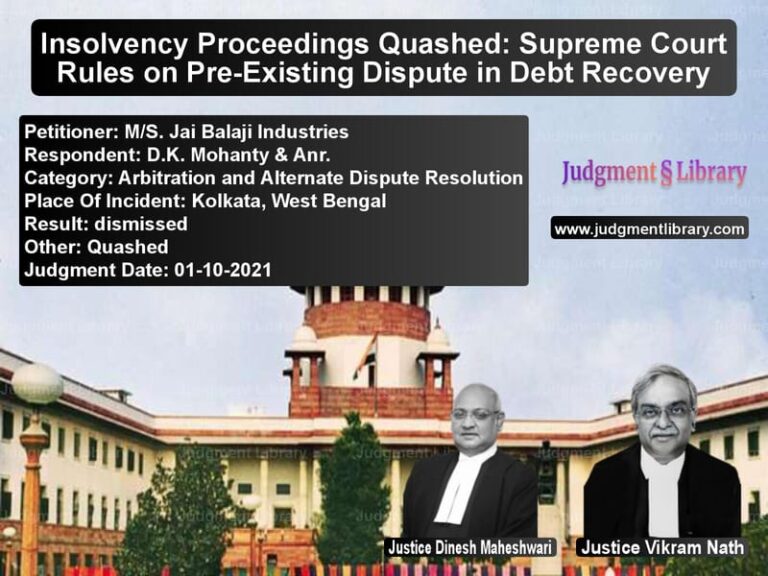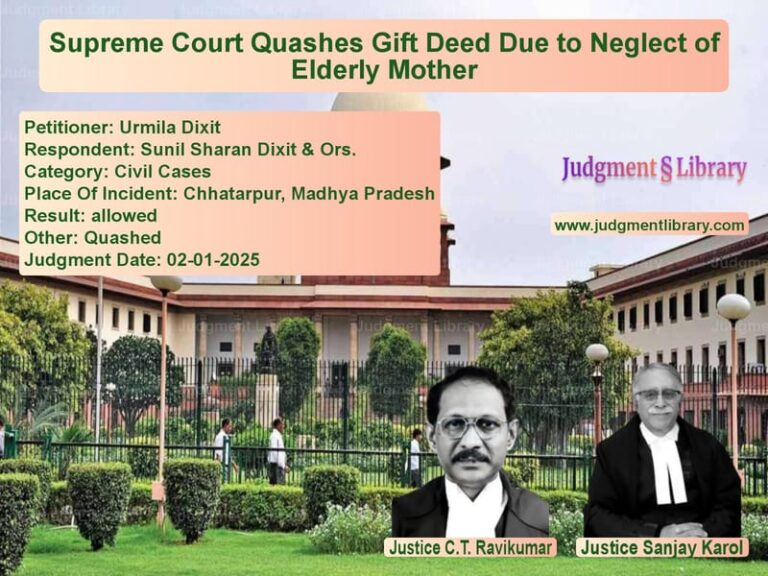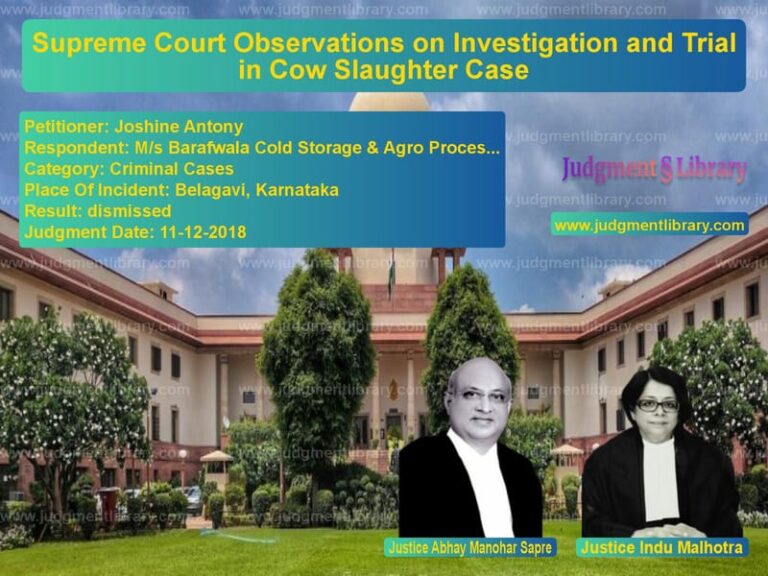Supreme Court Ruling on Vapour Recovery Systems and Environmental Compliance for Fuel Stations
The Supreme Court of India recently issued a significant ruling in the case of M/s Indian Oil Corporation Limited v. V.B.R. Menon & Others, addressing environmental compliance for petroleum retail outlets. The case focused on the installation of Vapour Recovery Systems (VRS) at fuel stations and whether new and existing petrol stations must obtain Consent to Establish (CTE) and Consent to Operate (CTO) from the Pollution Control Boards.
The Court’s decision has far-reaching implications for the oil marketing sector, state pollution control authorities, and the general public concerned with environmental protection. The ruling ensures that environmental norms are followed while preventing unnecessary regulatory burdens on businesses.
Background of the Case
The dispute originated from an application filed before the National Green Tribunal (NGT), Southern Zone, Chennai, by V.B.R. Menon, a resident of Chennai. Menon raised concerns about the environmental impact of petroleum retail outlets, particularly the absence of Vapour Recovery Systems (VRS), which are essential to control emissions of volatile organic compounds (VOCs) from petroleum products. He argued that failure to install VRS contributes to air pollution, posing health hazards to the public.
The NGT, in response, passed an order mandating:
- Installation of Stage-I and Stage-II VRS at all fuel stations in cities with over 10 lakh population and turnover exceeding 300 KL/month.
- The requirement for all new fuel stations to obtain CTE and CTO before establishment and operation.
- The need for existing fuel stations to secure CTO within six months or face regulatory action.
Following this decision, major oil marketing companies (OMCs), including Indian Oil Corporation Limited, Hindustan Petroleum Corporation Limited, Bharat Petroleum Corporation Limited, Nayara Energy Limited, and Shell India Markets Private Limited, challenged the order before the Supreme Court.
Petitioners’ Arguments (OMCs)
The appellants, represented by their legal teams, made the following key arguments:
- The NGT overstepped its jurisdiction by issuing directives that effectively amended existing environmental regulations.
- The Petroleum and Explosives Safety Organisation (PESO) already had comprehensive guidelines for fuel stations, rendering additional approvals redundant.
- Fuel stations fall under the “Green Category” of industries according to CPCB guidelines, which means they should not be subjected to CTE/CTO requirements.
- Mandating additional regulatory approvals would lead to delays in setting up new fuel stations, impacting fuel distribution and business operations.
Respondents’ Arguments (V.B.R. Menon & CPCB)
Menon and the CPCB countered these claims by emphasizing the importance of VRS installations:
- VRS is critical for reducing air pollution by controlling VOC emissions from fuel storage and dispensing operations.
- The current regulatory framework lacks strict enforcement measures, necessitating additional compliance mechanisms like CTE and CTO.
- The NGT had the authority under the National Green Tribunal Act, 2010, and the Environment (Protection) Act, 1986, to issue binding directives for environmental protection.
- Mandating CTE and CTO would enhance oversight and ensure greater adherence to environmental standards.
Supreme Court’s Judgment
A Supreme Court bench comprising Sudhanshu Dhulia and J.B. Pardiwala delivered the final ruling. The Court upheld the NGT’s directive regarding the installation of VRS but struck down the mandate for CTE/CTO, ruling that existing regulatory frameworks were sufficient.
“The CPCB shall ensure that all petroleum outlets in cities with over 10 lakh population and turnover exceeding 300 KL/month install VRS within the prescribed timeline. However, the requirement for CTE/CTO is unreasonable and should not be enforced.”
The Court provided clarity on the following issues:
- Fuel stations must install VRS as per CPCB guidelines and within the revised timeline set in the CPCB’s circular of June 4, 2021.
- The requirement for CTE and CTO is unnecessary and creates an additional regulatory burden that could delay business operations.
- The CPCB and SPCBs must ensure compliance with existing environmental norms through regular monitoring rather than imposing new approval requirements.
Implications of the Judgment
The Supreme Court’s decision has significant ramifications for environmental governance and business regulations in the fuel retail sector:
For Oil Marketing Companies:
- The ruling prevents excessive regulatory hurdles that could slow down the establishment of new fuel stations.
- OMCs are still responsible for ensuring that VRS installations meet CPCB standards.
- Non-compliance with VRS installation timelines could attract penalties from CPCB and SPCBs.
For Environmental Regulators:
- CPCB and SPCBs must enforce VRS requirements through periodic inspections and reporting mechanisms.
- State authorities must ensure that VRS is installed at all fuel stations operating in high-population areas.
- The absence of a CTO mandate means regulators will need to develop alternative mechanisms to monitor compliance.
For the General Public:
- The enforcement of VRS standards will help reduce air pollution from fuel stations.
- Public health risks associated with VOC exposure will be minimized.
- Increased transparency in fuel station operations due to CPCB oversight.
Conclusion
The Supreme Court’s ruling strikes a balance between environmental protection and regulatory efficiency. While ensuring that fuel stations comply with VRS installation norms, the judgment prevents unnecessary bureaucratic hurdles that could impede the industry’s growth.
The decision reinforces the principle that environmental regulations should be strictly implemented but should not create unnecessary obstacles for businesses. By upholding the essential environmental protections while removing redundant compliance requirements, the Court has provided clarity on the regulatory framework governing fuel stations in India.
The judgment sets a critical precedent for future cases involving environmental compliance, business operations, and regulatory oversight. It establishes that while environmental protection is a priority, regulations must be practical and enforceable without causing undue hardship to businesses.
Petitioner Name: M/s Indian Oil Corporation Limited.Respondent Name: V.B.R. Menon & Others.Judgment By: Justice Sudhanshu Dhulia, Justice J.B. Pardiwala.Place Of Incident: Chennai.Judgment Date: 13-03-2023.
Don’t miss out on the full details! Download the complete judgment in PDF format below and gain valuable insights instantly!
Download Judgment: ms-indian-oil-corpo-vs-v.b.r.-menon-&-other-supreme-court-of-india-judgment-dated-13-03-2023.pdf
Directly Download Judgment: Directly download this Judgment
See all petitions in Environmental Cases
See all petitions in Public Interest Litigation
See all petitions in Judgment by Sudhanshu Dhulia
See all petitions in Judgment by J.B. Pardiwala
See all petitions in partially allowed
See all petitions in Modified
See all petitions in supreme court of India judgments March 2023
See all petitions in 2023 judgments
See all posts in Environmental Cases Category
See all allowed petitions in Environmental Cases Category
See all Dismissed petitions in Environmental Cases Category
See all partially allowed petitions in Environmental Cases Category







